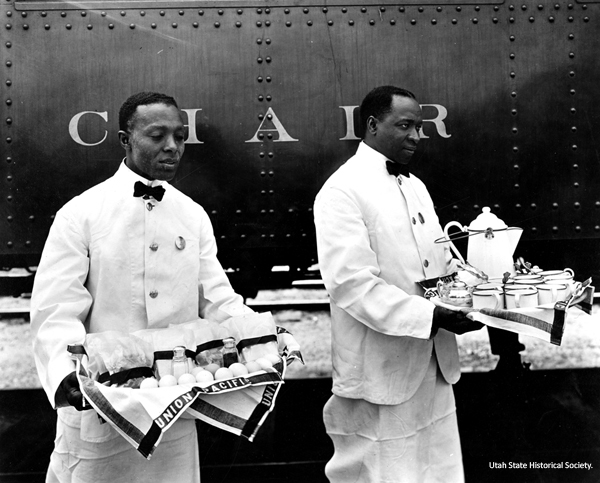Dublin Core
Title
Description
Americans love their entertainment. But how far would you travel for a bit of fun? Here’s why a music club on Ogden’s 25th Street became a place worth traveling to.
The rousing nightlife of cafes and clubs of the mid-twentieth century conjures nostalgia and images of carefree happy times. But what if you were African American? Laws segregating people based on race restricted access to school and work, separated communities and affected movement between them, and even interfered with the simple American pastime of having fun.
Salt Lake hotels, eateries, and other public places excluded people on the basis of race, with white-owned services often barred to black people. Not so at #127 25th Street in Ogden, home to the Porters & Waiters Club. This African American establishment opened in the early 1900s, and catered to African American porters and stewards who worked on the Union Pacific railroad line. It was a place for them to stay overnight or simply enjoy the club-like atmosphere.
The Porters & Waiters Club was also segregated. It allowed African-Americans only. If white people entered, they were kindly directed to white establishments on 25th Street. In turn, white establishments would direct African Americans to Porters & Waiters. Being so close to the Union Pacific railroad depot, Porters & Waiters – and Ogden in general – obtained the reputation as a destination for African Americans looking to escape segregation in Salt Lake. Musicians such as Louis Armstrong, Fats Domino, and Duke Ellington entertained white audiences in Salt Lake but were then denied access to the clubs where they played. So those musicians, and others like them, would catch the train to Ogden to visit the Porters & Waiters Club.
The strict segregation of black and white eased slightly in the late 1940s after the War. The now very popular Porters & Waiters Club was known for its spectacular entertainment and opened up to anyone eager to enjoy the talents of jazz greats like local legend Joe McQueen.
For African Americans living in a time when inherent rights were denied – including access to simple entertainment – Ogden’s Porters & Waiters Club was definitely worth the trip.
Creator
Heidi Orchard for the Utah Humanities © 2014
Source
See Davis, France. A., Utah in the ‘40s: An African American Perspective, Beehive History, 25, 1999, pp. 24-27. Holly, Val, 25th Street Confidential, Salt Lake City, Utah: University of Utah Press, 2013. Roberts, R. C. & Sadler, R. W., The Social and Cultural History of Weber County in the Twentieth Century, A History of Weber County, Salt Lake City, Utah: Utah State Historical Society, 1997, pp. 398-399. Coleman, Ronald G., Blacks in Utah History: An Unknown Legacy, Peoples of Utah, http://historytogo.utah.gov/people/ethnic_cultures/the_peoples_of_utah/blacksinutahhistory.html
Publisher
The Beehive Archive is a production of Utah Humanities. Find sources and the whole collection of past episodes at www.utahhumanities.org
Date
2014-06-13

